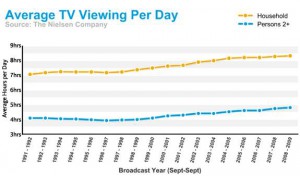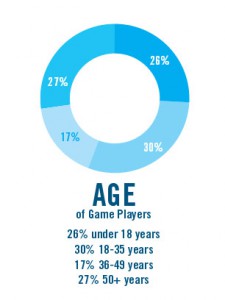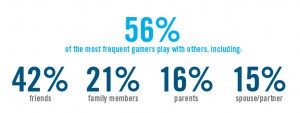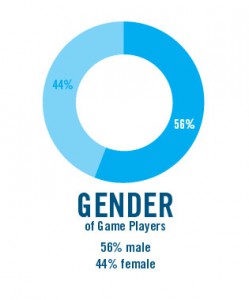I occasionally encounter people on gaming forums who talk about “hardcore gamers” as if there’s some kind of accepted definition of the term. You know: “hardcore gamers are gamers who play more than 25 hours a day and who only drink Red Bull intravenously” or something like that. The problem with such ‘definitions’ is that they rely heavily on vague concepts, which means it’s very easy to play with your interlocutor’s head by recursively asking them for definitions, complaining that their terminology is imprecise. That rhetorical technique is the real reason they killed Socrates.
So what is a hardcore gamer?*
One incredibly useful resource I found for talking about gaming demographics is the ESA (Entertainment Software Association) – the company that owns and operates the E3 gaming expo. As a consequence of where they sit in the industry, they see a lot of what the publishers are dealing with, gaming privacy/content legislation, game demographics, and the marketing spend of various big publishers.
They publish a report about gaming: READ IT, which is required reading for anyone who wants to say they know anything about hardcore gamers. It’s chock full of cool statistics like:

average TV time daily
When trying to nail down a definition of hardcore gaming, the first move I usually get is “hardcore gamers play a lot” Well, that’s pretty easy to respond to: “everyone plays a lot.” You want to know who really plays a lot? People stuck in airport departure lounges who play Sid Meier’s Pirates for iPad for 8 solid hours like my friend and I did in London’s Heathrow Airport, yesterday. Or the millions – literally millions – of people who play Candy Crush or Words With Friends while sitting on subways or buses to and from work.
Well, then there’s that other thing: age.

age distributions are lumpy
There seems to be a flat spot in the gaming demographics right around the age where people are at the peak of their careers. That sort of makes sense. One thing the ESA statistics really exploded for me is that hardcore gamers are not teenagers. There are some gaming communities that are dominated by older gamers. For example, the community that plays Elite:Dangerous has a substantial and very active community of 50-60 year-old pilots some of whom retired from flying for various air forces and who’ve had careers and show a great deal of self-discipline and who use IT skills very effectively. A teenager who goes up against a 53 year-old IT consultant that’s flying wearing an HTC Vive using a Hands On Throttle And Stick(HOTAS) set-up with foot pedals and speech-recognition commands, is in for a horrible and fairly brief dogfighting experience. I don’t think hardcore gamers are necessarily the old IT grey wolves who play macro’d, cool, calm and collected, either.
Maybe hardcore gamers are the ones who play the most popular games! You know, like: Whups… Like The Sims. Or Minecraft. And “Words with Friends” Words With Friends is huge in the smart phone gaming category, though I suspect Pokemon Go has blown it away for a while. But just in terms of who is playing what the most, the top games of all time are Minecraft, World of Warcraft, and Diablo 3. Then you get into Counter-Strike – the first 1st person shooter on the list – which is followed by The Sims.
Like The Sims. Or Minecraft. And “Words with Friends” Words With Friends is huge in the smart phone gaming category, though I suspect Pokemon Go has blown it away for a while. But just in terms of who is playing what the most, the top games of all time are Minecraft, World of Warcraft, and Diablo 3. Then you get into Counter-Strike – the first 1st person shooter on the list – which is followed by The Sims.
There is a key point beginning to emerge from all of this: Games have become a social phenomenon. My first years of gaming were spent sitting around playing Wing Commander or Gabriel Knight – alone – because low-cost networking wasn’t going to come along for a while.

Games are a family phenomenon as well. If I may add as an aside, that statistic looks like of weird: parents aren’t “family members”? How did they score it that way and why?
Where are we now in our quest to define a hardcore gamer? It’s starting to look more and more like a hardcore gamer is someone who spends 10-20 hours a week playing World of Warcraft with a circle of friends, or digging MineCraft with a parent. I do know one family that plays Call of Duty as a unit; their room entry technique is impeccable and the 14 year-old sniper is scary.
56% of The Most Frequent Gamers Play a Multiplayer Game At Least Weekly
I don’t think the people who talk about hardcore gaming are really talking about generic multiplayer, though. Mild Spoiler: usually around this time the hardcore gaming proponent says “you know, like Call of Duty – that’s a hardcore game!” Oh, well, it’s not even on the list of best-selling games of all time. Grand Theft Auto V has about the same sales as Euro Trucker, both of which – combined – are a 12th of the sales of World of Warcraft. If you zoom in on a single year then you’ll find the fad-games which haven’t made a blip in the best selling of all times chart: Call of Duty: Advanced Warfare was #1 in 2014, ahead of #2 Madden NFL 15. Then you have Bungie’s shooter #3 Destiny, followed by Grand Theft Auto V at #4 and Minecraft at #5. When you look just at the PC market, it’s: The Sims 4(#1) and The Sims 3(#2).
So, it’s not the age of the player community, it’s not the popularity of the game – what on earth is a hardcore game?
Around now is where I start asking them “Are you defining a ‘hardcore game’ as being a ‘boy’s club’? You know, a social space where homophobia, racism, and sexism are tolerated? Because it’s starting to look like we’ve eliminated the other possibilities.”
It gets interesting when you slice up the gender distribution in some of the popular games:***
World of Warcraft: M 60% F 40%
Minecraft: M 94% F 6% ( <- this was before it was available on Xbox!)
After Minecraft became available on Xbox, it adjusted to about 50/50. By the way, researching this kind of material can be painful if you have even a rudimentary understanding of science in general and statistics in particular. You’ll see lots of comments like  “I guess minecraft appeals more to men because thinky stuff.” You won’t see lots of comments like “I guess Madden NFL appeals more to men because men like thudding their heads against things.”
“I guess minecraft appeals more to men because thinky stuff.” You won’t see lots of comments like “I guess Madden NFL appeals more to men because men like thudding their heads against things.”
Old Guys People Rule
Another possibility is that hardcore gamers are gamers that have a life-long committment to games. I’ve heard that argument before, too, and I have to admit I like it because it places me somewhere in the hardness vicinity of tungsten. The first game I played was “spacewar” on a DEC PDP-1 in 1972 at the Johns Hopkins University summer fair. And I’ve been gaming to some degree or another ever since. But when you try to get into “how much gaming have you done?” fights it seems sort of irrelevant. If I had stuck with playing my version of Tank War I wrote on my high school’s Ohio Scientific Challenger, I’d be the undisputed world champion by now. Rating a gamer’s hardness based on what they’ve played results in silly things like trying to count the total number of titles played, or the total number of hours spent sitting in a chair.

Anita Sarkeesian and some games she’s played
That just gives a huge advantage to us older gamers in terms of our hardcore-ness. (I cannot help but notice Anita’s got no Amiga games or TRS-80 games, and no Atari 800 cartridges. Sniff. Xbox? She hasn’t even got any rolls of punched paper tape, FFS. Compared to me and my friends she’s a n00b. But then, compared to me and my friends, most gamergaters are n00bs too! Hey, I helped re-code and debug a decompiled version of Peter Langston’s Empire for BRL v6 UNIX, I can haz hardcore?)
There are No Hardcore Games, or Hardcore Gamers
There’s really no such thing as a hardcore game or a hardcore gamer. There are some people who take every single game seriously and/or spend insane amounts of time on it. Search for websites devoted to helping people cheatwin at Words With Friends and you’ll find lots. Search for websites devoted to pretty much any game and you’ll find it’s got a serious group of players, or it’s out of print and off the shelf.
The people I encounter who talk about hardcore gamers appear to me to be using vagueness to generate a mythical status of “hardcore gamer” that they can then claim that people are not. It’s a variation of a “no true scotsman” fallacy, and it’s easily defeated using linguistic nihilism.****
What’s going on is that there are games that are more or less popular and there are games that sell more or less well. The gaming industry is awake to the issue of gender in games and has been for some time, which is why we are beginning to see non-hypersexualized female avatars in some games and loosening of gender roles. There’s some outcry about this, of course, but it’s coming from those that are attempting to police and protect their perception of those pre-existing roles; a perception that is clearly demonstrated as wrong by anyone who looks at the demographics of gaming or where the money is being spent. The big companies that are producing games, like Blizzard, Bungie, Microsoft are not stupid (mostly) and see this as a matter of expanding their markets – deliberately limiting the appeal of your products is never a successful strategy in an entertainment industry. Similarly, limiting your social horizon is never a good strategy in a social game, unless your idea of fun is isolating yourself and then complaining that you’re lonely.
So the end-game for this discussion, for me, is to not allow my partner to claim any special status of “hardcore”ness and then switch the discussion to the properties of what makes a good game. Does having more complex and interesting plot structure make for a better game? Then embracing gender issues, gender oppression, and homophobia might make for interesting plot-points whereas leaving them out limits your landscape. Does having more complex and interesting characters make for a better game? Then embracing diversity ought to make for more interesting and complex characters, whereas games built around broad stereotypes aren’t just potentially offensive, they’re stupid and shallow. Does having the ability to play your character with a broader range of avatars give you more room to feel connected to your role-play? Then embracing diversity ought to make people role-play better – after all, we’re not all beefy white guys with 120″ shoulders and 26” waists and … oh, that’s not you either?
Sure, it’s about gender and class and power and whatnot, but it’s also about better games. That’s why the boys’ club in gaming is under attack: games like Duke Nukem are pretty stupid and it’s immersion breaking to try to get my head into that of a musclebound doofus who apparently has no cerebral cortex and operates off his brain-stem alone. When someone says that political correctness is ruining gaming, ask them why they want to play such bad games. There are loads of really great games out there and, ultimately, resorting to a bit of 3D rendered booty is a way of insulting the customer: “See? I think you’re so stupid you’ll buy this crappy game because it has a 3D rendered booty and a shelf-boob in it, instead of buying something that’s pretty good that has deep strategy and a plausible story-line driving the gameplay.”*****
If there are “hardcore gamers” they appear to be the players that like pretty mediocre games. Why are they patting themselves on the back for that?
(* I am going to avoid scare quoting “hardcore gamer” even though, by the time we’re done here, you’ll hopefully be as confused about what is a “hardcore gamer” as I am!)
(** I watched all of “Deadwood” while flying to the galactic core in Elite:Dangerous. It’s an excellent show.)
(*** I know it’s not binary, but that’s how the demographics I have are reported)
(**** I don’t know another term for it, but “linguistic nihilism” is my inner language for it. It’s when you use tropes of extreme skepticism, pyrhhonian-style, to destroy people’s ability to define words, then roll that into an epistemological challenge. That’s basically what this article is doing: if you can’t define “hardcore gaming” you don’t know what it is, and therefore maybe it’s a figment of your imagination. Socrates used this technique all the time, especially in Euthyphro, where Euthyphro complains to Socrates that:
I shall still say that you are the Daedalus who sets arguments in motion; not I, certainly, but you make them move or go round, for they would never have stirred, as far as I am concerned.
Another technique of linguistic nihilism is to deny your opponent the use of language by asking them to define terms until they fall into a circular argument, then reject their argument as untenable because the definitions depend on themselves.)
(***** I did play the beginning of Tomb Raider 1, but I deleted it because I was playing Master of Orion instead)

Hardcore gamers are anyone with the patience to learn a Paradox Interactive game. \m/
#UlmForHolyRomanEmperor
Shiv@#1:
That might actually be true!!!
But can we also get hardcore cred if we had to read the source code because there weren’t any directions? (Empire and Rogue)…
There are flight-simmers, and then there’s everybody else.
(I quit years ago, but I’m tempted by Elite: Dangerous.)
Dunc@#3:
There are flight-simmers, and then there’s everybody else.
The hardcore flight simmers who build their own cockpits… yipe. There’s guys who make command chairs for Elite, too – they’re pretty over the top. My HTC Vive came today :D I just got home from lavecon, where I had a chance to play with Elite on the Vive and it’s … amazing. So I won’t need a chair – I’ll be in VR.
Yeah, I quit because I found myself pricing up cockpit instruments and big multi-monitor setups…
The interesting question is not “who is a hardcore gamer?”. It’s “what does it say about a person that they feel the need to claim such a status for themself?”
I think the answer is just your basic mix of competitive elitism, tribalism and a need to bolster one’s self esteem.
Games are something that a lot of people like an awful lot. A lot of people tend to define themselves by their dedication to their hobbies. We live in cultures that approve of dedication, zeal, commitment and ardour. If I had to give a definition, I’d say that a “hardcore” gamer is someone who views playing games as a very important part of their self-image.
cartomancer@#6:
If I had to give a definition, I’d say that a “hardcore” gamer is someone who views playing games as a very important part of their self-image
I like that! It’s deliciously self-referential: if you say you’re a hardcore gamer, then you are.
It may be an essentially contested concept, but I know it when I see it.
John Morales@#8:
I’d never run across the term “essentially contested concept” before, but I like it!! Thanks for the reference.
I look forward to seeing if you can keep me honest on the linguistic nihilism. I’m still arranging how I want to try to approach that topic.
One might define it someone who spends the largest amount of their non-sleeping and (if they have a job) non-working time playing games, but that sounds more like obsessive behaviour. Another might be someone who plays until they discover and remember all the secrets, tricks, easter eggs and bugs within a game and/or competes in speedruns. Even so, neither is universal and probably won’t describe many who give themselves that name.
As an aside, Marcus, I note you’ve only used one tag for this post, but you’re not just talking about gaming, are you?
—
To contribute, I personally think that anyone who games professionally (earns a living at it) could hardly be other than hardcore at it.
(I hear it’s a pretty competitive field…)
“But can we also get hardcore cred if we had to read the source code because there weren’t any directions?”
You have source code? That’s too easy.
When I was still coding things (around ’70s and ’80s) there were situations where we had to hack binary code. OK, so the debugger could show the bits as assembler instructions, but it could also be a data field, and not an instruction at all…
In those days there wasn’t much need for games, because the work was itself very much like a game. Getting the box to work was quite rewarding. But occasionally we might waste some time in Zork.
BTW, someone should make a game where you have to modify the binary code to get maximum points. That would be pretty hardcore.
I think the category of hardcore gamer needs to be refined and preserved, not because I have any interest in being seen as a hardcore gamer — on my blog, I deliberately label myself a “Not-So-Casual Gamer” — but because it is important to understand the distinction between hardcore and casual gamers because they, in my opinion, want and need different things from games.
But, first, you seem to have made an error in your calculation of hours above. From the report, you call playing games regularly as being at least 3 hours per week, which I would put firmly into the “casual” category. 3 hours a week is not a lot. But you then try to compare that as being only a little less than what we get from Nielsen, but the chart shows that that is 4 hours PER DAY. So you’d be comparing 28 hours per week to at least 3 hours per week and saying both that the latter is quite large — and would count as hardcore under the “total hours” definition — AND is only slightly smaller, given that it’s only a 25 hour difference and that at that scale they would be playing games, on average, only about 10% of the time they watch TV.
Let me run a couple of definitions by you for “hardcore” and “casual”, both of which I think apply and that tend to get conflated in these discussions. The first is based on how important video games are to you, which can, I think, be summed up with hardcore gamers being those for whom video games are their primary pass-time, while for casual gamers it is a pass-time, but they tend to do other things more or as a more primary pass-time. The second is based on how informed you are about video games, where hardcore gamers by that measure are those who make a strong, active effort to keep fully informed on the state of gaming by reading gaming sites, following releases, viewing videos, etc, etc while casual gamers only check these things when something happens to catch their eye or when they hear about something interesting, or on very special events. Casual gamers, here, might skim the news about E3, for example … while hardcore gamers will stream and comment on every single presentation (yes, I know people who’ve done that [grin]).
While it’s possible for these two categories to be distinct, in general someone will be hardcore on both. If video games are your primary pass-time, you’ll definitely want to spend a lot of time keeping up with it, and if they aren’t, you aren’t likely to do more than skim. And it’s also a bit of a continuum, so there can be gray areas, and I think I am one … and you also, then, can’t object to the definitions by insisting that not everyone who is called hardcore streams E3 presentations [grin].
For me, I’m Not-So-Casual on the first definition because games aren’t my primary pass-time — reading is — and I can go a long time without playing, but typically I have either a game going on or planned all of the time. And on the second definition, I know more about games than lots of people and follow some at least loosely gaming sites, but in general daily it’s non-gaming sites that I follow.
I think these definitions have critical consequences for what each group will want from a game. Your thoughts?
Verbose Stoic@#13:
But, first, you seem to have made an error in your calculation of hours above
It was deliberate – I was trying to illustrate that there is a wide range of ideas about what constitutes “a lot of hours gaming” … says the guy who once sat in chair playing Elite for 16 hours straight. And, as I said, I was watching “TV” during most of those 16 hours, too. I think I’m a bit uncomfortable with trying to draw lines there because the lines there are personally uncomfortable and very blurry.
The first is based on how important video games are to you, which can, I think, be summed up with hardcore gamers being those for whom video games are their primary pass-time, while for casual gamers it is a pass-time, but they tend to do other things more or as a more primary pass-time.
That’s pretty good. But I consider my primary pass-time to be reading books. And I’d argue that any definition of “hardcore gamer” that doesn’t encompass me is seriously missing the point. :)
The second is based on how informed you are about video games, where hardcore gamers by that measure are those who make a strong, active effort to keep fully informed on the state of gaming
That’s also a good one!
I think that what winds up happening is that we acknowledge it’s a vague concept and say that there are several criteria that make up a “hardcore gamer” blah blah blah. That’s kind of how vague concepts work.
I think these definitions have critical consequences for what each group will want from a game.
I think that’s backwards – those definitions (hence the groupings) are emergent consequences of what the people already want. So, I would say that the best thing we can do is say “there are games like Candy Crush – let’s call them ‘compulsion-inducing timed pattern games’ and that there is broad inter-game appeal within that category: people who like Candy Crush probably like Tetris, but don’t necessarily like World of Warcraft.” Coming up with such a taxonomy would be fun and probably pretty contentious.